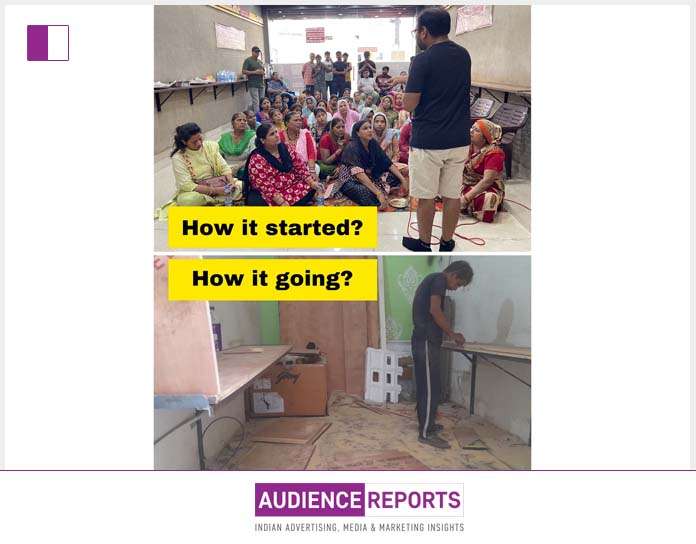Kiran Verma’s journey exemplifies the profound impact of social entrepreneurship. Kiran Verma, driven by a vision to empower marginalized women, demonstrates how resourcefulness and compassion can turn limited funds into lasting change. In a world where large-scale solutions often dominate discussions, Kiran Verma’s story stands as a testament to the power of small but impactful initiatives.
Kiran Verma recently shared an inspiring story about transforming a modest sum into a tool for empowerment. With Rs.125,000 in hand, Kiran Verma set out to make a difference. Each month, Kiran Verma hosts gatherings for women from weaker sections of society in Maujpur, Delhi. These events are more than just social gatherings; they are opportunities to connect, support, and uplift women facing significant hardships. It is within this context that Kiran Verma’s commitment to creating change truly shines.
At a recent event, Kiran Verma encountered a young girl who requested Rs.1,200 for computer coaching. The girl’s hopeful eyes stirred something in Kiran Verma. While Kiran Verma did not provide the money immediately, the encounter sparked a deeper reflection on how to address such needs sustainably. The idea was not just to provide temporary relief but to create a lasting impact.
Motivated by this encounter, Kiran Verma decided to invest the funds in starting a computer institute. The goal was clear: to establish a self-sustaining educational facility that could offer affordable computer education to young girls. Kiran Verma’s approach was strategic and thoughtful, focusing on long-term sustainability rather than short-term fixes.
The plan was straightforward yet effective. Kiran Verma rented a small room and set up a computer lab with seven computers and one instructor’s desk. An investment of Rs.50,000 was made for the setup, while Rs.80,000 was used to purchase six refurbished desktops. This initial investment of Rs.1.2 lakhs was designed to ensure that the institute would be financially self-sufficient.
Kiran Verma’s calculation was precise. With the capacity to run eight batches at a time, accommodating 56 students, the institute was projected to generate around Rs.28,000 in monthly revenue. With operational costs, including rent, electricity, and miscellaneous expenses, capped at Rs.15,000, and the salary for a qualified female instructor ranging from Rs.10,000 to Rs.12,000, the institute would cover its costs and remain sustainable.
Kiran Verma’s approach highlights several key aspects of successful social entrepreneurship. First, Kiran Verma understood the importance of financial planning and resource management. By creating a model where revenue generated from the courses would cover the operational costs, Kiran Verma ensured that the institute would continue to function without needing additional funds. This sustainable model is crucial for any social initiative aiming for long-term impact.
Second, Kiran Verma’s initiative underscores the value of addressing specific community needs. Instead of a broad, generalized approach, Kiran Verma focused on a pressing need within the community: access to computer education. By aligning the initiative with the needs of the local population, Kiran Verma increased the likelihood of success and relevance.
Moreover, Kiran Verma’s story illustrates the power of empathy and personal connection in driving social change. The initial interaction with the young girl and her request for computer coaching was not just a moment of charity but a catalyst for a broader impact. Kiran Verma’s willingness to listen and act on this need led to the creation of an educational facility that will benefit many young girls in the future.
Kiran Verma’s commitment to creating a positive impact is reflected in the heartfelt appreciation received from the community. The blessings and gratitude from those benefiting from the initiative are a reminder that while financial success is important, the true reward lies in the positive changes one can create in the lives of others.
Kiran Verma’s initiative also serves as an example for other social entrepreneurs. It demonstrates that substantial change does not always require large-scale investments or extensive resources. With careful planning, dedication, and a clear vision, significant impacts can be achieved even with limited funds.
Kiran Verma’s story is a powerful example of how small investments can lead to substantial social change. By addressing a specific need within the community and creating a sustainable model, Kiran Verma has built a platform that will empower many young girls in Maujpur. Kiran Verma’s approach highlights the importance of empathy, resourcefulness, and strategic planning in social entrepreneurship. As Kiran Verma continues this journey, the lessons learned from this endeavor will undoubtedly inspire others to pursue similar impactful initiatives.




































